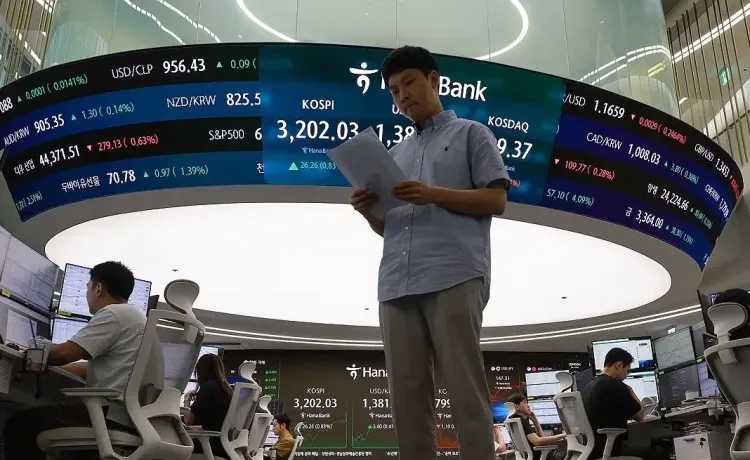Is the KOSPI Facing a Decline Due to Valuation Concerns and US-China Trade Issues?

Synopsis
Key Takeaways
- The KOSPI closed at 3,953.76, down 1.8%.
- Major tech stocks are facing challenges due to AI-related concerns.
- Trade tensions between the US and China are impacting investor sentiment.
- The South Korean won reached a seven-month low against the dollar.
- Investors are advised to stay informed about market trends.
Seoul, Nov 7 (NationPress) Following a volatile trading session, South Korean stocks concluded the day 1.8% lower on Friday, marking the end of a tumultuous week. This decline was largely driven by significant losses in major tech stocks amid worries regarding an artificial intelligence (AI) bubble and escalating trade tensions between the United States and China.
The benchmark Korea Composite Stock Price Index (KOSPI) fell by 72.69 points, or 1.81%, closing at 3,953.76. It even dipped to an intraday low of 3,887.32, as reported by Yonhap news agency.
Trading volume remained steady at 366.7 million shares, valued at 18.6 trillion won (US$12.8 billion), with the number of declining stocks outpacing those that gained, at 677 to 211.
Both foreign and institutional investors were net sellers of local stocks, offloading 472.2 billion won and 228.1 billion won, respectively. In contrast, retail investors maintained a buying trend, acquiring 695.9 billion won.
This week, the KOSPI experienced notable volatility, reaching a peak exceeding 4,200 on Monday before plunging nearly 3% on Wednesday.
The KOSPI opened lower, following losses on Wall Street, which were triggered by renewed fears regarding inflated valuations of AI-related stocks and data indicating a cooling labor market.
The Dow Jones Industrial Average decreased by 0.84%, the tech-heavy Nasdaq composite fell by 1.9%, and the S&P 500 dropped 1.12%.
Recent figures from Challenger, Gray & Christmas Inc. highlighted that U.S. companies announced 153,074 job cuts last month, which is nearly three times the number reported in the same month last year.
In the early afternoon, the KOSPI experienced a more than 3% tumble after media outlets reported that the White House decided against permitting Nvidia to sell its latest AI chips to China, raising fears that trade tensions between the two largest economies might escalate again, according to Seo Sang-young, an analyst at Mirae Asset Securities.
Furthermore, China's exports fell by 1.1% in October, marking the first year-on-year decline since March 2024, which raised concerns that South Korea's exports might also be affected, Seo added.
In Seoul, market leader Samsung Electronics dropped 1.31% to 97,900 won, while its competitor SK hynix declined 2.19% to 580,000 won, impacted by worries surrounding the AI bubble.
Leading automobile manufacturer Hyundai Motor fell 1.86% to 264,000 won, and its affiliate Kia decreased 1.7% to 110,100 won.
Top battery manufacturer LG Energy Solution saw a 1.38% decline to 463,500 won, while Samsung SDI plunged by 4.97% to 306,000 won.
Electrical equipment producer HD Hyundai Electric plummeted by 6.51% to 818,000 won, and state-run Korea Electric Power fell 4.34% to 44,100 won. Major power plant developer Doosan Enerbility decreased 1.77% to 77,900 won.
Defense stocks took a significant hit, with Hanwha Aerospace down 4.85% to 932,000 won and LIG Nex1 dropping 16.53% to 401,500 won.
However, major shipbuilder Hanwha Ocean was among the few to gain, rising 3.09% to 126,800 won.
Kakao, the operator of the leading mobile messaging app in the country, surged 3.46% to 62,800 won after reporting better-than-expected earnings.
The local currency was traded at 1,456.9 won against the dollar at 3:30 p.m., which is a decrease of 9.2 won from the previous session, reaching a seven-month low.
This is the first instance since April that the currency has dipped below the crucial 1,450 won level, as foreign selling of local stocks has put additional pressure on the currency.
Bond prices, which move inversely to yields, closed lower. The yield on three-year Treasuries rose by 6 basis points to 2.894%, and the yield on the benchmark five-year government bonds increased by 5 basis points to 3.043%.









